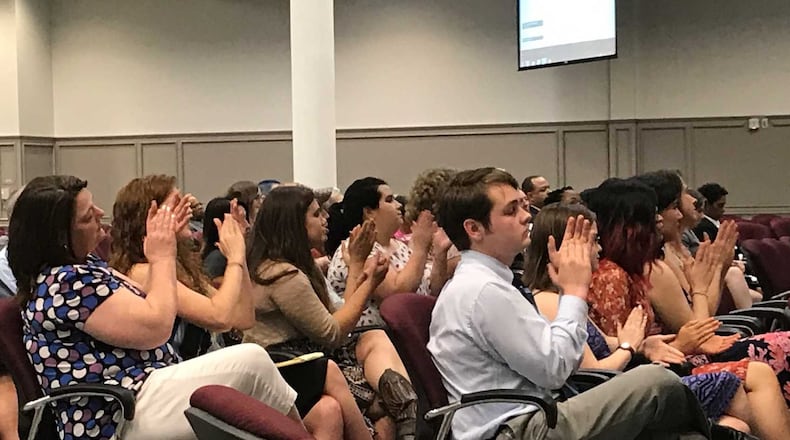Talking about sex in Georgia’s public schools is no easy chore, many metro Atlanta school districts have learned.
Gwinnett County is the latest school district facing scrutiny about some of what’s taught in its sex ed classes.
About two dozen parents, students and former students came to last week’s school board meeting, with some saying during the public comments portion that one organization has used crude exercises and outdated beliefs to encourage abstinence. The group at the center of the criticism, the Pregnancy Resource Center of Gwinnett, did not respond to the specific complaints, but defended its work at the meeting.
The dispute underscores the difficulty elected officials and educators have resolving conflicts between those with divergent cultural and religious ideologies in increasingly diverse communities like Gwinnett as schools grapple with sex-related topics they didn't encounter a decade ago, such as restroom accommodations for transgender students.
On one side, some argue sex education should focus squarely on abstinence. On the other side, the argument is students need to be exposed to as much information as possible.
Some suggest the latest criticism is a plot by Planned Parenthood supporters to get like-minded organizations teaching sex ed in Georgia and are taking the fight to social media.
Opinions vary on the effectiveness of sex ed in Georgia. Federal data suggest some trouble spots in the Peach State.
Georgia ranks among the top 10 states in several sexually-transmitted diseases (STDs) among 15 to 24 year-olds. Its youth HIV rate is twice the national average. The most recent data show Georgia has the 18th highest teen birth rate. Georgia, though, had the highest rate in 1995, when the state decided to focus on abstinence-based sex education.
One positive note for Georgia is federal statistics show a decline over the last decade in the percentage of ninth- and tenth-graders having sex.
Gwinnett is one of several area school districts that use an abstinence-centered curriculum called “Choosing the Best.” Gwinnett has used the curriculum since 2001 and a committee reviews it throughout the year, school district officials said. Other area districts that use “Choosing the Best” include Fulton, Cobb, Clayton, Forsyth, Marietta, Hall, and Fayette, Gwinnett officials said. Parents can choose not to allow their children to participate in the sex ed classes.
Polls shows parents overwhelmingly support sex education, but that's where the consensus typically ends. DeKalb County dropped "Choosing the Best" about a decade ago in response to parent protests about its accuracy, switching to a program called FLASH, "Family Life and Sexual Health." In 2015, Fulton updated its materials, saying many of them had become outdated. Some health care advocates and parents argued the lessons didn't teach teens how to protect themselves from pregnancy and sexually transmitted diseases.
Sex education in Georgia can begin in the sixth grade but some organizations, such as Planned Parenthood, suggest elementary school students could use teaching that includes lessons on friendship skills and understanding that no one else should have control over your own body.
“It’s about navigating complex questions about life and love,” said Katherine George, Planned Parenthood Southeast’s director of education.
George and others say some sex ed reinforces gender stereotypes and contains some inaccurate information.
In Gwinnett, Georgia’s largest school district, sex ed is typically one week and part of the district’s health course curriculum. Health teachers conduct most of the sex education. The classes, students say, are typically lectures along with some videos of students explaining good and bad choices they’ve made.
Gwinnett allows trained speakers from some organizations to conduct some sex education, based on using the school district’s approved curricula. The Pregnancy Resource Center of Gwinnett is one of those organizations.
Kristen Rawls, 19, who graduated from Gwinnett’s Brookwood High in 2016, took sex ed as a freshman and didn’t find it helpful. She said she wanted to learn more about how STDs are contracted, about birth control and condoms and sexual consent. Rawls said she was offended by a lesson that compared virginity to a flower and told students “no one wants a flower who has no petals.”
“As a 14-year-old girl at the time, I cannot express the amount of damage this did to me … I still think about these words every time I meet someone who I might like,” she said.
Although the criticism wasn’t all about the Pregnancy Resource Center of Gwinnett, many of the complaints were focused toward the Lawrenceville-based organization. The center, opened in 1991, describes itself as a Christian ministry that encourages women not to have abortions and has worked in Gwinnett schools since 2002. Its IMPACT Abstinence Program has had four complaints since it was implemented in 2002, school district officials said.
“We believe that sex education should promote behavior that reduces unplanned pregnancies, sexually-transmitted infections, and the risks associated,” Robin Mauck, its executive director, told school board members.
Brookwood High School parent Tamara Ashley said she asked people to join her at last week’s meeting because she said prior efforts to address her concerns went unaddressed. She and others want closer oversight of its sex ed teaching. There’s some talk about proposing another sex ed curriculum.
Several school board members said they were unaware of the concerns and said they’d review the complaints.
Ashley said it seemed some board members were resistant to their complaints.
“That’s alright,” she said. “We’ll continue to work on it.”
In other Education news:
About the Author
Keep Reading
The Latest
Featured

